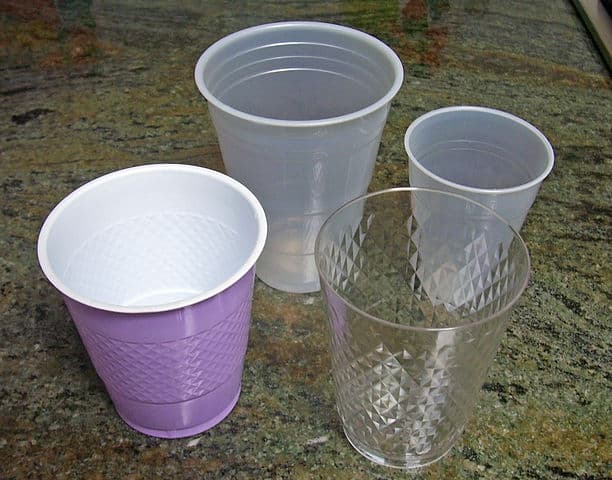That plastic is at the root of our waste woes and in fact, of most environmental risks besieging the planet today is well-acknowledged. In Bengaluru, even before the official ban on plastic by the state government, alert neighbourhoods and citizen groups had started their own campaigns against the use of plastic. However much of the dialogue that one gets to hear is against the use of plastic ‘carry-bags’ that most people have grown used to.
While these pose a menace indeed, are the ubiquitious plastic bags (polythene) the only form of plastic that ends up in our landfills? If we think deeply and observe our regular daily activities, we will be surprised to see how rampant our use of plastic is.

Assortment of disposable plastic cups. Pic: Daniel Case (Wikipedia)
Just to quote a few examples, here are some of the most common yet critical uses of plastics by people from various strata of society:
- Simple ball point pen
- Pencil boxes, tiffin boxes and water bottles
- Shoe bases
- Craft items like Thermocol (Expanded Polystyrene), shiney wrappers, sticker labels, cellotape
- Milk pouches: These are multi layer laminates (cannot be separated or co-extruded) of polythene
- Tetra Packs of milk, juices, buttermilk
- Personal care items like soaps, shampoo, deodorants
- Pots for plants
- Hangers for clothes
- Buckets and cups
- Mattresses (if you see inside, you will find polyurethane that is added for that extra spongy feeling)
- Packaged groceries and food items
- Car and bike parts
- Furniture (chairs, tables etc)
So, what is the way out?
This of course, is not an exhaustive list of all the plastic products we use, nor will it be possible to reject the use of all of this at once. However, the idea is to be more conscious when we are buying any product and note the amount of plastic that we buy along with it.
It would not have been an issue if these products (plastic) were invariably recycled and reused. But in a majority of cases, they will not be recycled due to multiple reasons like feasibility, the differences in the type of plastic used, such as colours, grade, type etc.
Banning polyethene bags is a big positive step towards greener and sustainable living. But it is time to sharpen our awareness and become conscious about any purchase decision, even of small/cheap products like a pen or packaged food.
No one single organisation or agency, whether the Government or private companies (plastic manufacturers or consumer goods manufacturers), can be held solely responsible for the amount of plastic waste that we generate in our city. As end users who buy those products, we are also responsible in significant measure for the composition of waste. If we continue to buy products packaged the way they are, we would be creating DEMAND for plastic, hence ensuring that SUPPLY goes on.
Therefore, next time you step into a store, mall or stationery stop, do ponder a while before you decide to make a purchase. How much plastic will you be using? Is there an environment-friendly alternative to it?
Related Articles
Plastic can be dangerous in many ways
Plastic ban won’t affect jobs, say govt, analysts
Plastic ban: 25,000 to lose jobs; Industry seeks solutions
Plastic ban now official in Karnataka
Bengaluru is being swept by citizen-led plastic bans
Thank you for listing the many things I’ve also thought about but never got around to writing about! Add toothbrushes, combs to the list, as well as the thousands of plastic bottles and plastic/metal laiminated strips that medications come in.